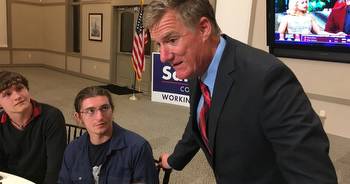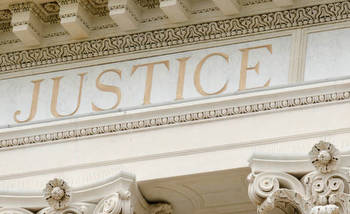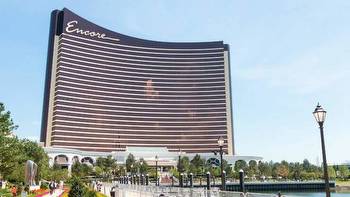Gaming Commission asks feds to shut down illegal gambling
Gamblers in Massachusetts have a full menu of wagering options to choose from these days: physical casinos, sports betting in person or online, and the state lottery, which some officials are itching to bring online as well. One thing not on the menu, Bay State regulators want to make clear, is illegal gambling.
Members of the Massachusetts Gaming Commission are going to send a letter to US Attorney General Merrick Garland, asking the Justice Department to do more to combat illegal offshore sports books and online casinos. These operators, the commission agreed to write in the letter, “often take advantage of the legalized landscape in jurisdictions such as Massachusetts to attract customers to their products.”
The commission members decided in a meeting Tuesday to join seven other states – Colorado, Louisiana, Michigan, Mississippi, Nevada, New Jersey, and Illinois – calling on the federal government to crack down on the operators.
Commission chair Cathy Judd-Stein said Massachusetts has led the country in encouraging responsible gambling that prioritizes consumer protections.
“We as a commission also have recognized along the way that, as regulators, we must strike a balance and policymaking to ensure that our new regulated market here in Massachusetts advances the well-being of all residents here on working to not just compete with the illegal market, but also put it out of business,” she said.Gambling is now big business in this famously puritanical state. Its three casinos brought in $1.13 billion in gross gaming revenue last year, according to the American Gaming Association. Sports wagering in April saw in-state sports bets of almost $580 million, mostly from online betting, generating about $59 million in taxable gaming revenue.
Regulators and the gaming association do not want to see that money jeopardized. According to a report last year from the association, Americans bet more than $510 billion each year with illegal and unregulated operators.
This translates into significant lost revenue, undermining “the considerable economic benefits that come with regulated gaming,” the gaming association report says. “The scale of the tax loss is enormous: more than half of all potential state gaming tax dollars are lost to unregulated operators.”
Aside from the dollars and cents question, regulators are also troubled by illegal operators because they lack protections like age verification requirements, controls to prevent money-laundering, and guarantees that customers will receive fair payouts.
Generally, disrupting illegal gambling operations falls to the Justice Department. In before the US House Committee on Oversight and Government Reform in 2015, Joseph Campbell, the assistant director of the FBI’s criminal investigative division, said the agency “carefully used its limited resources to focus its investigation and prosecutions of Internet gambling on those groups engaged in egregious criminal conduct.”
Online gambling poses a tremendous risk of illegal and fraudulent activity, Campbell said. Because it is easier for criminal actors to hide their identities, online casino schemes bear even more risk for the player than an in-person casino, he said.
Eight years later, a letter sent on April 28 by the states beseeches the Justice Department to move the issue up its to-do list.
“The many significant threats posed by offshore illegal gambling cannot be addressed by states alone and, therefore, require heightened federal attention and engagement,” they wrote. “We strongly encourage the Department of Justice to prioritize investigation and prosecution of these offshore sites, and stand ready to provide any assistance that we can as state gaming regulators.”Commissioners considered and approved minor edits to their letter on Tuesday. Commissioner Nakisha Skinner asked Judd-Stein if there is any information on current Justice Department efforts to combat the illegal gaming issue. The Justice Department did not respond to a request for comment from CommonWealth on Tuesday.
”I think that we might not know,” Judd-Stein said. “I imagine there are efforts underway. But they might not be able to reveal them to us.”
JENNIFER SMITH
FROM COMMONWEALTH
No big deal: MBTA General Manager Phillip Eng says he didn’t tell his board of directors about a letter from the Federal Transit Administration sending the agency back to the drawing board on a critical safety plan for railway maintenance because he didn’t see it as a big deal. “It wasn’t something that shocked me because we are always going back and forth with the FTA,” he said. “I just looked at this as just part of an ongoing effort.” .
Life science tax breaks: Gov. Maura Healey gives 43 life science firms, many of them very profitable, tax incentives worth $24.4 million. The biggest winner was Moderna. .
OPINION
Rein in PBMs: William Smith of the Pioneer Institute urges state lawmakers to rein in pharmacy benefit managers and limit out-of-pocket drug costs. .
FROM AROUND THE WEB
BEACON HILL
House backers think this might finally be the year their chamber will pass legislation setting forth new curriculum guidelines for sex education in schools. (State House News Service)
MUNICIPAL MATTERS
Framingham city councilors are considering a new flag policy after the US Supreme Court ruled earlier this year that Boston violated the Constitution when it refused to fly a Christian flag on one of the flagpoles outside City Hall. (MetroWest Daily News)
HEALTH/HEALTH CARE
A federal appeals court overrules a lower court and says Purdue Pharma can file for bankruptcy protection in a way that shields the Sackler family from future lawsuits dealing with its role in the opioid crisis. As part of the deal, the Sacklers will pay $5 billion to $6 billion and lose control of Purdue Pharma. (NPR)
Health care workers, residents, and elected officials rallied to protest the planned closure of the maternity ward at UMass Memorial Health Care’s Leominster campus. (Boston Globe)
WASHINGTON/NATIONAL/INTERNATIONAL
House Speaker Kevin McCarthy is scrambling to keep enough Republicans in line to advance the debt limit deal he struck with President Biden as right-wing members of his caucus revolt against the plan. (New York Times)
ELECTIONS
Worcester voters could see as many as 42 names on their municipal ballots this year, with 29 candidates vying for city council seats and 13 for school committee. (Worcester Telegram)
Former New Jersey governor Chris Christie will join the Republican race for president next week. (USA Today)
BUSINESS/ECONOMY
Automakers file suit in Massachusetts seeking to block enforcement by the attorney general of a right-to-repair statute until a lawsuit challenging the statute is resolved. (Eagle-Tribune)
EDUCATION
The Boston public schools now spend more per pupil, $31,397 per year, than any other large district in the country. (Boston Globe)
TRANSPORTATION
The MBTA Transit Police Department is investigating the death of a passenger who fell under a Green Line train at North Station. (WBUR)
Some initial funding for East-West Rail that Gov. Maura Healey included in her budget did not make it into either the House or Senate budget, prompting mixed feelings in the 413. (Western Mass. Politics & Insight)
ENERGY/ENVIRONMENT
An annual fishing derby on Lake Winnipesaukee in New Hampshire is canceled because of declining stocks of salmon. (New Hampshire Public Radio)
Former governor Charlie Baker’s son, Andrew Baker, following his OUI arrest, losing his license for 45 days and being required to attend an alcohol-education program. (
































